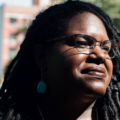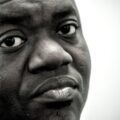There’s No Place Like Home

“Everything I know of home / Is captured by the image of a man running from / The police, his arms flailing unlike any bird you’d expect / To fly.”
Reginald Dwayne Betts, “Parking Lot”
“Maybe memory is all the home / you get.”
John Murillo, “Mercy, Mercy Me”
I watched the entirety of Ava Duvernay’s four-part Netflix mini-series, When They See Us, in one sitting. I did not intend to watch it in one sitting. Earlier that morning, I’d bought a five-pound pork shoulder from our local farmer’s market, and I planned to, at midnight, season (salt, freshly cracked black pepper, minced garlic, fennel pollen), sear in a pan, and slowly braise it in my Crockpot overnight as I slept.
However, when I placed the pork shoulder in the slow cooker, its base—where its heat and power and timer reside—wouldn’t switch on. It would take five to six hours to braise the shoulder in the oven, and I didn’t trust myself with a cellphone alarm (exhausted by the day), so I decided to wait up with it, to remain awake, as if rocking a fussy baby to sleep over and over again. The mini-series had been out a week or so by then and was on my list to watch, so what better time or excuse, right?
So, I watched. Alone. In the dark, a large yellowish moon hovering outside my window, like an idea, or a balloon caught in the trees. It is a difficult mini-series to look away from, even if one were so inclined to look away.
When I finished the final episode, the sky was lightening from a deep purple to a soft blue, the way a bruise might lighten, as proof of its healing. I’d wept hard, and felt tender as shoulder meat sloughing off the bone. Even if you haven’t seen the mini-series, you likely know the story: five teenagers—boys of color—Antron McCray, Kevin Richardson, Yusef Salaam, Raymond Santana, and Kharey Wise—are wrongly accused of beating and raping a 28-year old woman, a white investment banker, as she jogged through Central Park. They were coerced into signing false confessions and served between six and thirteen years in prison.
The mini-series opens in 1989, but it could have just as easily been today. Donald Trump, then a real estate developer and private citizen, appears briefly in the second episode of the mini-series being interviewed by Larry King shortly after he’d spent upwards of $85,000 to take out full-page ads in local newspapers demanding, in capital letters: “BRING BACK THE DEATH PENALTY. BRING BACK OUR POLICE.”
One might argue these were simply words. Like inscrutable. Mayhem. Or Wal-Mart. It’s just language, you might say. One man’s opinion. And one might say the same about poems in general. These ads, however, this rhetoric, branding the boys “muggers and murderers,” played a significant role in shaping the public’s opinion and discourse about the case before the trial would even begin. These words incited awful violence against these boys, despite their innocence.
I should also say, I didn’t anticipate writing any of these details—but in setting out to write an essay on the poetics of home in the African-American Diaspora, it felt disingenuous to not consider these and countless other facets of this country’s history.
Poet Rick Barot, in an interview, remarked that “[f]or many of us, home and birthplace and country can mean several different places,” and this is true. There are many African-Americans who consider Africa home, the “motherland” in fact, though they were neither born there nor have ever stepped foot on her soil. You know the story. Africans were stolen, kidnapped from their homeland—enslaved, exploited, and brutalized in the newly-formed America. This is not African-American history but American history, a portion of history some are convinced has a statute of limitations. I’ve heard it all: Why should I pay for something that happened 400 years go? That wasn’t me. I don’t feel responsible for the sins of my father, or my grandfather, or a generation. That was such a long time ago—you’re still upset? You’re not over that yet?
Decades later, the same Donald Trump who, in 1989, on national television, proclaimed “maybe hate is what we need if we’re gonna get something done,” is the current president of the United States. The same Donald Trump who charged four freshman lawmakers—Alexandria Ocasio-Cortez, Ilhan Omar, Ayanna Pressley, and Rashida Tlaib—women of color—with “hat[ing]” America “with a passion,” and recommended, surely you remember, “If you’re not happy here, then you can leave, as far as I’m concerned, if you hate our country… go back and help fix the totally broken and crime-infested places from which [you] came,” even though three of the four, like many African-Americans, were born here, in America.
How does one negotiate home then? Of course, Trump was hardly the first. On August 14, 1862, Abraham Lincoln, commonly hailed as “The Great Emancipator,” hosted a “Deputation of Free Negroes” at the White House to discuss a plan to colonize freed black Americans elsewhere, arguing, “You and we are different races” and “have between us a broader difference than exists between almost any other two races.” Furthermore, “[you] suffer very greatly… by living among us, while [we] suffer from your presence.” Lincoln went on to suggest, “But for your race among us, there could not be war,” and “without the institution of Slavery and the colored race as a basis, the war could not have an existence.” His conclusion was “for us both… to be separated.”
Where do you go when you’re told to go back to where you come from, but you come from… here? How does one negotiate “home” in a country that seems to make more evident every day that it does not want you, or wants you, but maybe dead, or wants you, but poor or imprisoned?
I’m reminded of E. Ethelbert Miller’s poem, “Looking for Omar,” published in his 2004 collection, How We Sleep on the Nights We Don’t Make Love, though the poem itself is dated “Nashville, TN / 10/12/01,” just about a month after the Towers fell. It manages to be and not to be, at once, a September 11 poem. The poem’s structure is simple and straightforward, consists of thirteen stanzas and eleven largely declarative sentences. The majority of the stanzas, like couplets in ghazal, are wholly contained, housed within themselves, though our attention to Miller’s stanzaic composition and deployment of image reveal the poem’s broader intention. Image, particularly image via the simile, is often deployed in service of building the speaker’s credibility; in stanza three, “the big boys come in talking / loud and cussing like they / rap stars or have new sneakers” (my italics). In stanza five, “Pinto talks with an accent / like he’s new in the neighborhood too” (my italics). These images offer insight into the speaker’s psychology, frame-of-reference, and worldview.
However, when we reach stanza seven, the images take on a different metaphorical weight, which is further reinforced in the disruption of the stanzaic pattern Miller has earlier established—the sentence suddenly parsed over two stanzas which, structurally, also prepares us for the poem’s close. Grammatically, this stanza functions like a sentence fragment, requiring the previous stanza, its direct antecedent, to provide context or meaning. To read the opening of the stanza anachronistically, “My momma said it’s like / a woman losing both / breasts to cancer,” begs the question, what is it, though the preceding stanza makes quite clear—we’re discussing “the Towers and how they / ain’t there no more,” which is, according to stanza six, what “everybody is talking / about.”
The image is nuanced, complicated, offering both psychology and argument. Syntactically, one tragedy is positioned as subordinate to the other—the seemingly more significant national loss—the Towers—engulfing the more localized, cultural, and personal loss—Ms. Gardner’s two tall boys. Structurally, as well as syntactically, the boys get the least priority, although the stanzaic structure betrays the form’s ability to neatly contain these losses, enacting their immensity, albeit un-televised, granted only the small stage of the poem, as it’s enjambed over two stanzas (“Bullets flying into / both boys heads / making them crumble too.”). And if we were uncertain of Miller’s intention, the clause’s diction—that the bullets “fly” and the “tall” boys “crumble too”—should ensure that we bind the two tragedies in terms of scale.
Cancer, if ignored, if left unchecked, like the terrorism to which the poem alludes, would consume the body in its entirety. Sometimes, despite our efforts, the host is still consumed by the disease. The poem, from its very title, presents, among many things, a moment of consequence: will the speaker run and tell Omar, or will the speaker just run? Will Omar be found and, if so, by whom? What will happen to him?
I don’t have answers to these questions and that’s part of the poem’s effectiveness. As it closes, the poem returns to the earlier narrative details of its opening—with the washing of hands. However, the instruction of the speaker’s mother, distinguished typographically with italics and is the only other instance in which the sentence is enjambed over two stanzas, is weighted with metaphorical significance. Her counsel seems simple, practical—“always remember to wash / your hands”—though we clearly recognize by now that “washing” doesn’t rid the self of responsibility or guilt: “always remember / you can’t wash your hands from / everything”. While the poem is released in the present tense, there is clearly an earlier version of the speaker recounting the narrative; so, what pulls him back to this moment? Momma’s voice not only reaches across the stanza but across time. What also might reach across time could be regret. The speaker’s wet hands are dripping on his shoes. Even still, trapped inside a parable and its lesson, which persist.
Nearly two decades later, the tagline for September 11 remains “Never Forget,” the irony of which is not lost on me. You can tell a great deal about a country and a people by what they deem important enough to remember, to create moments for—what to house in museums and celebrate or grieve. In writing this essay, I thought of how much easier it might be to simply look away. Why stand here, staring so intently at the past? Jotting your little notes? Recording the names: Tamir, Sandra, Akai, Eric, Michael—far too many more to keep track or silkscreen onto a tee shirt. And now Breonna Taylor. Ahmaud Arbery. George Floyd. Never forget. But that was so long ago. Country. Birthplace. Home.
I have lived in a number of places throughout my life, none of which I might designate as home. So, in one sense, my title, which you should surely recognize, absolutely calls back a sentence which, when repeated with the clicking of ruby red slippers in the film, rouses a young white woman from her “dream” of being trapped in a world saturated with (Techni)color. But in another, maybe, for the African-American poet, home is sometimes less of a place and more a people—a brother or sister everywhere I go—for where there is family, perhaps too—home.
Poet Nate Marshall, in his “Landless Acknowledgment,” closes with “why you think I call my / compatriots homies?” For the slaves locked in hull of a ship, I can only imagine the the harbor of one another to ground or anchor. One of my favorite moments in “Looking for Omar” is at the outset, the poem’s speaker having committed to washing his hands, even “without / soap.” Then, in the second stanza, looking for paper towels, which aren’t there, which “have been gone / since the first day of school / and it’s June now”. This, too, is a moment of consequence, and it would be easy to highlight the school’s, and by extension, the community’s need, its underserved or impoverished state, and miss that the speaker, despite being conditioned to expect absence or lack, looks for paper towels anyway.
About Nathan McClain
Nathan McClain is the author of Scale (Four Way Books, 2017), a recipient of fellowships from The Frost Place, Sewanee Writers' Conference, Bread Loaf Writers' Conference, and a graduate of Warren Wilson's MFA Program for Writers. His poems and prose have recently appeared or are forthcoming in Green Mountains Review, Poem-a-Day, The Common, The Baffler, and Far Villages: Welcome Essays for New and Beginner Poets. He teaches at Hampshire College.





